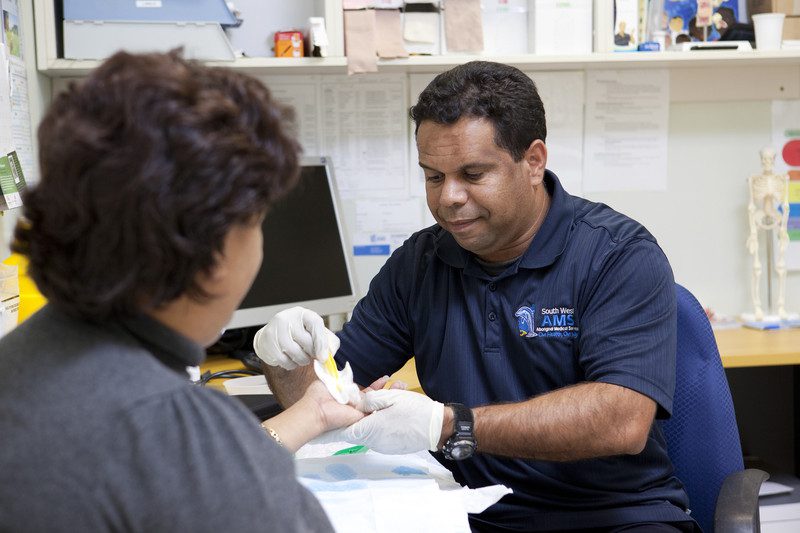
An Aboriginal health worker with SWAMS for two years, Clement Jetta hails from the Western Australian Wheatbelt, but moved to Bunbury with his parents when he was eight. A big believer in the importance of community, Clem describes how he builds relationships with his clients, and suggests ways in which Aboriginal people can start improving their health now.
Why do you think it’s so important to have Aboriginal health workers in the community?
Clem: My role is basically as an advocate. I’m the person in between the doctor and the client. We’re the people who help the clients with their medications and make sure they are taking [them]. Doing home visits, doing recalls and follow-ups with the nurses and GPs.
And we do a lot of work with the community: promotions for health checks, diabetes and vaccinations.
What are the most chronic and preventable illnesses you see in the community?
Clem: The big one is diabetes. We’re trying to get a hold on that. But it’s very hard with the clients because of the balance in the household with the children and parents … we just try and get them to eat healthy … three vegies and two fruits … the main meals of the day.
We’re trying to help them exercise as well. We’ve got a couple of activities for clients with the … hydro therapy pool.
We’re also trying to get a men’s shed running for the guys, for the community involvement … Aboriginal men don’t concentrate on themselves. They concentrate on everyone else. But they need to think about themselves. I always say, Think about Number One first, because once you’re gone, this whole community could fall down.
What do you think it means to local Aboriginal people to have you as a contact point?
Clem: I see my position as helping the community … I’ve got a lot of community involvement. I coach football, with girls and boys, and I’m community oriented, so I’m the person who goes out to the clients’ houses. I’ve never been turned away yet. I’m local so … they are happy to see me. I think that’s a good thing for SWAMS.
Basically I’m there to better the health of all the Aboriginal clients and Torres Strait Islanders. We’ve got a few Torres Strait Islanders here now.
How is your job helping to Close the Gap?
Clem: We’re making it better for people to access their medications and getting them the medical treatment they need. Also it gives us the power to go and see them more and get them to come to the doctors and do their follow-ups. With Close the Gap I think we are improving. Over the two years I’ve been here, I’ve seen a lot of people getting healthy.
When I first started we had a lot of clients going to the doctor’s surgery. But now we’re getting less people in hospital … A couple of weeks ago I went to the hospital and there was no-one there for about three-to-four days, so that was good. I was thinking: we must be doing something right in the community. The community is becoming happier with SWAMS I think. And they’re glad we are there: they know we’re there to help them.
With diabetes you get a lot of sickness; you can’t move. You’re a couch potato, sitting back at home and doing nothing instead of getting out with the kids or helping in the garden. Just going for a walk: once they go for a walk, they feel much better the next day. Our role is to get them off that lounge, to come out and do something, even for 15 minutes. Then you can gradually build on that.
I want to see more traditional food presented to the Elders. We just need a way to get that too. It’s hard because there isn’t much bush around … But … a lot of that food is good for them, like kangaroo and wallaby.
It’s best to … start getting the kids in … train them first. Target the kids here: get them involved with community, especially the older kids at uni. I don’t want them all to just go and do labouring jobs. I really want more young people working here.
(This was the last interview in our SWAMS series. We hope you’ve enjoyed reading how Clem, Hayley, Steve and Katherine are making a difference in their communities, helping their clients negotiate the healthcare system and encouraging them to lead healthier lifestyles.)
Find out more
Read more about SWAMS (South West Aboriginal Medical Service)
Sign the Close the Gap pledge